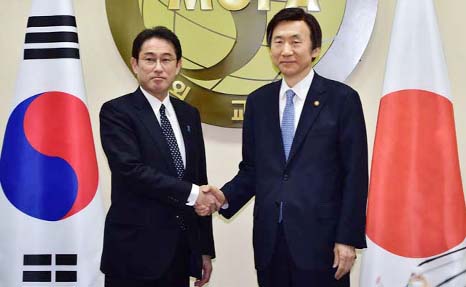
AFP, Seoul :
South Korea and Japan reached a landmark agreement Monday on the thorny issue of wartime sex slaves that has long soured relations, with Tokyo offering survivors a one-billion yen payment.
The deal would be “final and irreversible” if Japan fulfils its responsibilities, South Korean Foreign Minister Yun Byung-Se said after talks with his Japanese counterpart Fumio Kishida.
Kishida said Japan agreed to offer a one billion yen ($8.3 million) payment for Korean “comfort women” who were sexually enslaved by Japanese troops during World War II.
“It’s not compensation. It’s a project to recover the honour and dignity of all comfort women and to heal their emotional wounds,” he said.
“The comfort women issue… occurred with the involvement of the Japanese military… and the Japanese government acutely feels its responsibility.”
Japanese Prime Minister Shinzo Abe offers an “apology and repentance from the bottom of his heart” to the victims, Kishida said.
“I think the agreement we reached is historic and is a ground-breaking achievement,” he said.
The fate of the 46 surviving South Korean comfort women is a hugely emotional issue in the country and a source of much of the distrust that has marred relations with its former colonial ruler for decades.
The United States has long pressed its two major Asian allies to resolve their disputes.
Under Monday’s agreement Seoul will try to relocate a statue symbolising comfort women which currently stands in front of the Japanese embassy through consultations with relevant NGOs, Yun said.
Tokyo has given priority to relocating the statue, seen as an embarrassing eyesore and an insult to Japan.
The South Korean foreign ministry said earlier on its Facebook page that the statue was erected by civilians and the government had no say over its location.
Yun said Seoul would refrain from bringing up the comfort women issue again in international forums such as the United Nations.
“I am very pleased to declare the successful conclusion of the difficult negotiations before the year is out, the 50th anniversary of diplomatic ties,” he said.
Up to 200,000 women, many of them Korean, are estimated to have been sexually enslaved by Japan during World War II. They were euphemistically known as “comfort women”.
Seoul has demanded a formal apology and compensation for the survivors.
Kishida said that with Monday’s agreement, relations between Japan and South Korea would develop into “a future-oriented new era”.
The deal, he said, “will not only benefit our country but also largely contribute to the region’s peace and stability”.
South Korea and Japan reached a landmark agreement Monday on the thorny issue of wartime sex slaves that has long soured relations, with Tokyo offering survivors a one-billion yen payment.
The deal would be “final and irreversible” if Japan fulfils its responsibilities, South Korean Foreign Minister Yun Byung-Se said after talks with his Japanese counterpart Fumio Kishida.
Kishida said Japan agreed to offer a one billion yen ($8.3 million) payment for Korean “comfort women” who were sexually enslaved by Japanese troops during World War II.
“It’s not compensation. It’s a project to recover the honour and dignity of all comfort women and to heal their emotional wounds,” he said.
“The comfort women issue… occurred with the involvement of the Japanese military… and the Japanese government acutely feels its responsibility.”
Japanese Prime Minister Shinzo Abe offers an “apology and repentance from the bottom of his heart” to the victims, Kishida said.
“I think the agreement we reached is historic and is a ground-breaking achievement,” he said.
The fate of the 46 surviving South Korean comfort women is a hugely emotional issue in the country and a source of much of the distrust that has marred relations with its former colonial ruler for decades.
The United States has long pressed its two major Asian allies to resolve their disputes.
Under Monday’s agreement Seoul will try to relocate a statue symbolising comfort women which currently stands in front of the Japanese embassy through consultations with relevant NGOs, Yun said.
Tokyo has given priority to relocating the statue, seen as an embarrassing eyesore and an insult to Japan.
The South Korean foreign ministry said earlier on its Facebook page that the statue was erected by civilians and the government had no say over its location.
Yun said Seoul would refrain from bringing up the comfort women issue again in international forums such as the United Nations.
“I am very pleased to declare the successful conclusion of the difficult negotiations before the year is out, the 50th anniversary of diplomatic ties,” he said.
Up to 200,000 women, many of them Korean, are estimated to have been sexually enslaved by Japan during World War II. They were euphemistically known as “comfort women”.
Seoul has demanded a formal apology and compensation for the survivors.
Kishida said that with Monday’s agreement, relations between Japan and South Korea would develop into “a future-oriented new era”.
The deal, he said, “will not only benefit our country but also largely contribute to the region’s peace and stability”.

